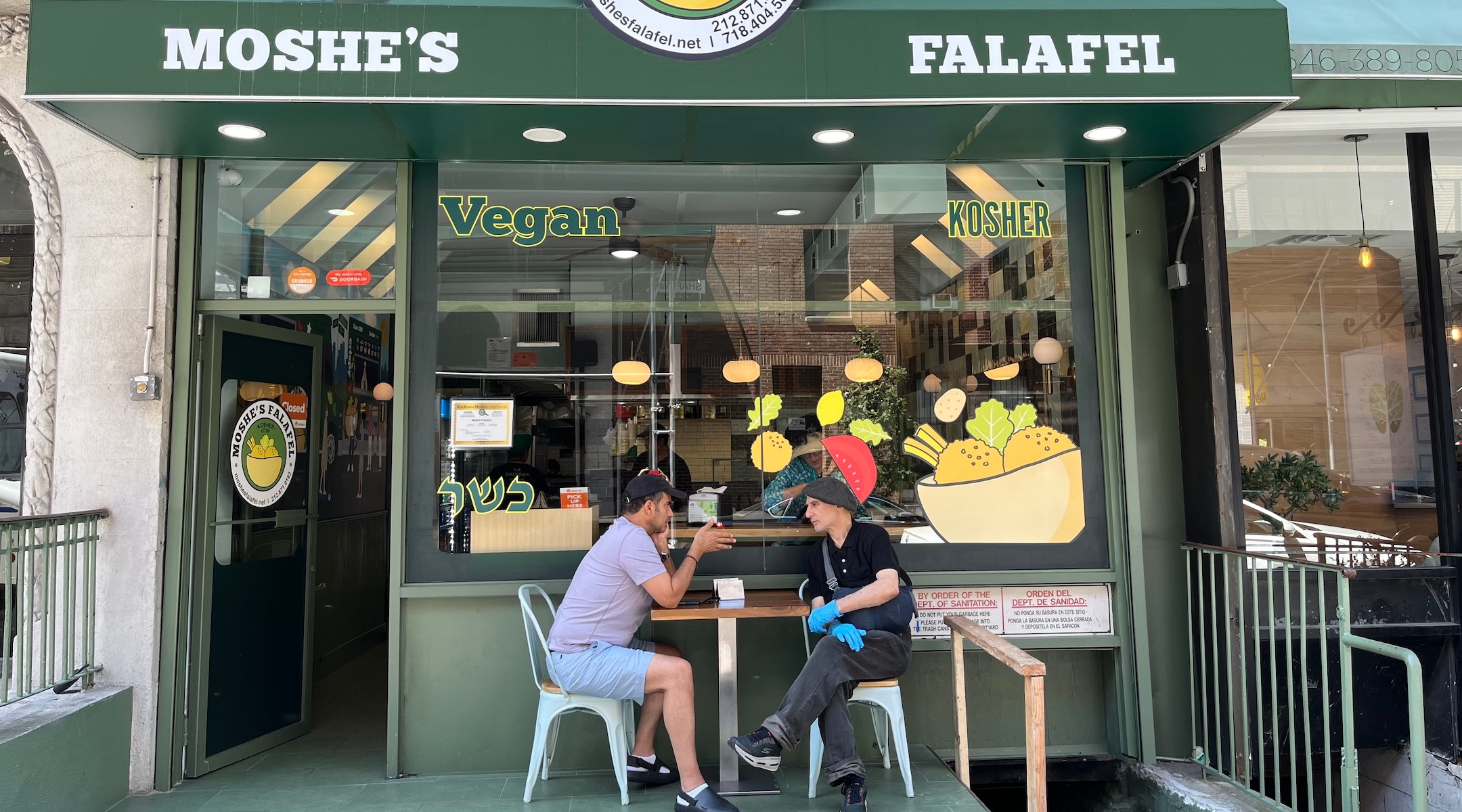Moshe’s Falafel has been making its kosher falafel much in the same way it has since it opened as a Diamond District food cart in 1981: fresh and fully loaded, with many of the ingredients imported from Israel.
But now, Moshe’s Falafel will be slinging chickpea balls from a brick-and-mortar storefront. Last week, business partners Moshe Mizrachi and David Itah opened a highly anticipated Moshe’s Falafel restaurant at 142 West 83rd St. on Manhattan’s Upper West Side.
“People wanted us to open all over many times before. This time we had the time and we found the right spot that suits us,” Itah told the New York Jewish Week on opening day, July 25. “There are a lot of Jewish people here. It’s a nice community. So we decided to begin here.”
When Mizrachi opened his first Moshe’s Falafel 43 years ago — first as an ill-fated restaurant mid-block on West 46th Street, and then as a successful food cart parked at the corner of Fifth Avenue and 46th Street — “very few people knew what falafel was,” Mizrachi told the New York Jewish Week. “It took a few years to build it — [for people] to be exposed to falafel and eat it.”
Now, however, falafel is a popular food across the city — in fact, Brooklyn’s Falafel Tanami, a small kosher joint in Midwood, has been named to the New York Times’ list of 100 best restaurants in the city for two years in a row. There are literally dozens of falafel places to choose among, including the Syrian-owned mini-chain Mamoun’s Falafel, which opened its first restaurant in Greenwich Village more than 50 years ago, as well as Taim, the falafel chain launched by Israeli chef Einat Admony in 2005.
Two years ago, Moshe’s Falafel — which Jewish food doyenne Joan Nathan called “the best stretch pushcart in New York City” in her 1994 book “Jewish Cooking in America” — added a second food truck to its stable. It is regularly parked in and around Times Square, though it is often rented out for private events.
Ari Senderowicz, a 30-something Manhattanite, was one of many New Yorkers who came to the Moshes’ Upper West Side outpost on opening day. “They have some of the better falafel that I have had in the city,” he said. “It’s comparable to the falafel I have had in Israel.”
News of the storefront first emerged in the spring. Elan Kornblum, founder of Great Kosher Restaurants Media Group, posted about the restaurant’s forthcoming on Facebook on April 5 — the same day that an earthquake rattled Manhattan. “Great Kosher Restaurants Foodies Earth Quaking Breaking Shattering News,” he wrote. “This is really going to shake up Manhattan.”
“Everyone is excited about it,” Kornblum told the New York Jewish Week. “They have a cult following. Those who know and have had it really enjoy it.”
While Itah waited for the requisite permits — these days, Mizrachi is more of a silent partner, as he spends his days learning and teaching at a local yeshiva — he built awareness in typical ways, such as posting on social media. Over the past several weeks, Itah also gave away some 2,000 free pita sandwiches filled with Moshe’s signature falafel topped with all the fixings, including tahini, chopped salad, hot sauce, French fries and pickles.
On July 10, the first day of the giveaway, Itah parked one of his two food trucks in front of the yet-to-open store. He planned to dole out free stuffed pitas from noon to 4 p.m. By 3:30 p.m., the truck had run out of food — despite the 90-degree heat, close to 800 people had been served. (Apparently, free food is something New Yorkers are willing to stand on line for.)
Over the course of the next two weeks, Itah parked the falafel truck outside Jewish hotspots like the iconic Jewish grocery Zabar’s on the Upper West Side and in front of Anita La Mamma del Gelato, which was founded in a kitchen in Netanya, Israel, on the Upper East Side.
The modestly-sized restaurant, which seats 18 and is decorated in the food truck’s signature herbal green color, sells the same food as the Moshe’s Falafel carts: falafel, hummus, fried cauliflower coated with shawarma spices, plus some side salads for takeout. Going forward, all of the food sold from the truck, push cart and restaurant will be prepared in the restaurant’s kitchen.
Like many popular kosher restaurants of late — like Guy Vaknin’s Siete, a Mexican restaurant, and Beejhy Barhany’s Ethiopian-Israeli Tsion Cafe — Moshe’s Falafel is fully vegan. Their Iraqi sabich sandwich, which traditionally comes with fried eggplant, pickles, hummus, tahini and hard-boiled egg, is served without an egg. Even the mayonnaise they use to bind their purple cabbage slaw is egg free.
The secret to his decades of success, Mizrachi said, is following the advice his wife gave him when he first launched. “I asked my wife, may she rest in peace, how to do it so people will come again,” he said. “She said, ‘If you want people to come back, you have to give them the falafel the way you like to eat it.’”
He continued: “You like it fresh? Yes. You like it clean? Yes. You like it to look nice? Yes. You like the oil [for frying the falafel balls] to be changed every day? Put all these together, she said, and it will be the best falafel.”
“Everything is high end,” Itah said. “The secret is that everything is new, every day.”
The pita, he said, comes from Angel Bakeries — a New Jersey bakery with origins in Jerusalem — and is heated before serving. The tahini is an Israeli brand, Har Bracha, and the crunchy pickles are from Israel, too.
The restaurant is close to other kosher restaurants, including gluten-free specialists Modern Bread & Bagel, which is around the corner, and the Tex-Mex Carlos & Gabby’s.
The hope is to open more spots in the city, “maybe in other cities in the United States eventually,” Itah said.
Riva Atlas lives three-and-a-half blocks from the new Moshe’s Falafel, and she expressed excitement over the storefront finally being open.
“I’m thrilled — I’ve been counting the days,” she said. “I love falafel. And, to be honest, I felt great walking in here and hearing Hebrew in a time like this. With everything going on in Israel, it feels good.”
The New York Jewish Week brings you the stories behind the headlines, keeping you connected to Jewish life in New York. Help sustain the reporting you trust by donating today.





